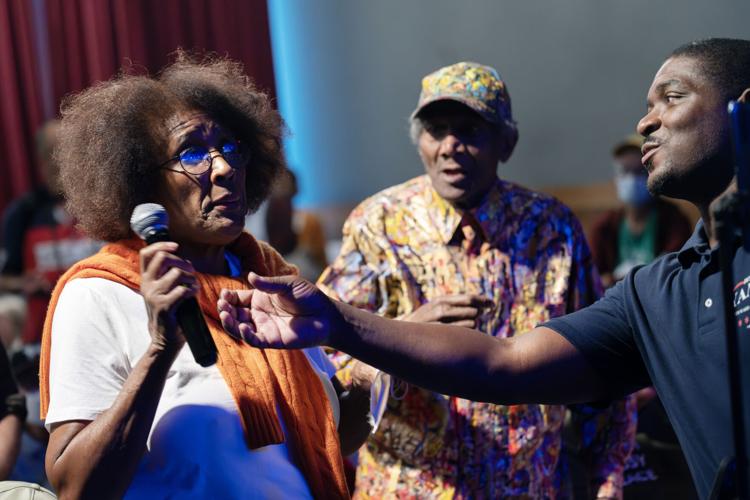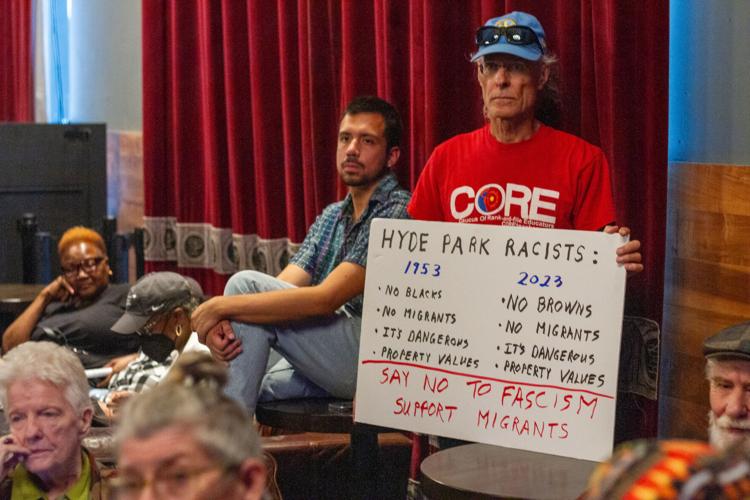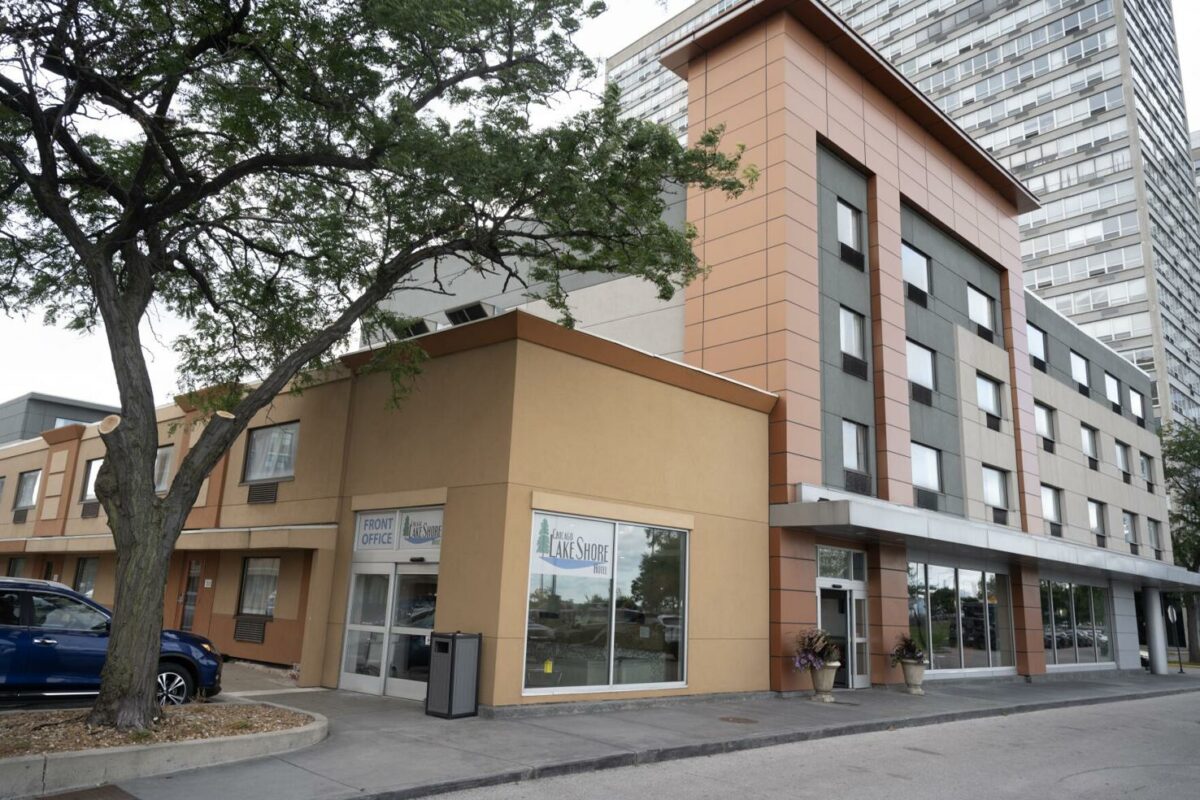This story was originally published by the Hyde Park Herald on Wednesday, August 30. Reprinted with permission.
In a contentious community meeting Wednesday, Hyde Parkers were divided over city plans to use East Hyde Park’s Lake Shore Hotel as a temporary shelter for hundreds of migrants. Many attendees were outspoken in their disapproval of asylum seekers moving into the community, while others encouraged the neighborhood to open its arms.
About 200 people gathered for the Aug. 30 meeting at The Promontory, 5311 S. Lake Park Ave. Held by Ald. Desmon Yancy’s (5th) office and city officials, the meeting was intended to answer neighbors’ shelter questions but speakers were frequently drowned out by shouting among some audience members.
“No. (Migrants) shouldn’t come until all the homelessness in the South Side here in Hyde Park is taken care of first, then immigrants can move in,” said Cornel Benford, a community member. “They try and overpopulate Chicago to a point where we’re not gonna have enough money to support the people that’s here already.”
“We are a city of immigrants … we are a united city,” said Brenda Delgado, a Hyde Parker who coordinates a volunteer team providing aid to migrants housed at local police stations. Urging for the creation of a shelter, Delgado continued, “We have neighbors who are sleeping on cardboard outside of police stations.”
As of August 30, the city planned to start moving about 300 men, women and children into the hotel as early as Friday, Sept. 1. (Yancy’s office was previously told the move would begin on Sept. 5.). Many of the migrants moving into the Lake Shore Hotel, 4900B S. Lake Shore Dr., are families currently staying at the 2nd District police station in Washington Park.
Officials said they plan to use the hotel for about six months. From January to April of this year, the Lake Shore Hotel had been used as a temporary shelter for about 50 migrants. This history and the hotel’s large capacity, Yancy said, is why officials chose the location.
“But I was not a part of any conversations with the owners of the hotel … I’ve gotten very limited information from the city,” Yancy said at the top of the meeting. “We’re here because I thought it was important for people in the community to know what’s going on, even if the mayor’s office wasn’t willing to.”
According to Stephen Chung, Deputy Chief of the Chicago Police Department, security contracted by the city will be on the premises 24/7, and an 11 p.m. curfew for those living at the shelter will be instituted. CPD officers will conduct frequent patrols of the area, paying “special attention” to the shelter. Visitors are not permitted and residents are required to sign in and out of the shelter with hotel staff.
Residents may be discharged from the shelter if found to be in violation of the facility’s rules, such as breaking curfew, engaging in violence and drug use.
As for support, health care and mental health services, English classes and connections to support networks—such as faith-based organizations and nonprofits—will be provided. Case management services will also be provided on site.
The Lake Shore Hotel shelter is part of a wider city effort to house the more than 13,500 men, women and children who have arrived in Chicago seeking asylum since last August. Most of these people have traveled to the U.S. from South America and been bussed to Chicago—without warning—from border states like Texas.
More than 6,679 new arrivals are currently housed in 16 temporary migrant shelters across the city. Another 1,650 people are awaiting shelter placement and are sleeping on the floors of police stations and airports.
The meeting was held one day before the year anniversary of the first bus arriving in Chicago. Since Aug. 31, 2022, more than 217 buses have arrived in the city. According to officials, two more buses arrived on Wednesday.
Early in the meeting, Jesus Del Toro of Chicago’s Office of New Americans stressed compassion and patience from residents as the city’s resources are stretched thin under the influx of new arrivals. He also urged the federal government to intervene.
“We’re trying our best to meet the moment, but without federal action such as funding or the ability for (migrants) to work, we find ourselves in a hole,” said Del Toro. “Our goal is to meet folks’ basic needs, but also put people into a path to resettlement.”
“This hotel is a temporary solution, but the goal is a path to resettlement,” he added. “The alternative (to shelters) in my eyes is 13,000 to 14,000 people in Chicago unhoused. That creates another potential public safety situation.”

He was quickly interrupted by members of the audience shouting alternative cities in the state for migrants to be relocated.
“It is an intentional attack on the city of Chicago to get us to be divided,” argued Ald. Andre Vasquez (40), the chair of the city’s Committee on Immigrant and Refugee Rights. The reference to Texas Gov. Greg Abbott (R), who has sent a majority of the buses of migrants to Chicago in protest of federal immigration law, was met with loud applause.
“Every single day, we’re seeing 80 to 100 people being sent to the city,” Vasquez added.
Community tensions during Hyde Park’s meeting largely mirrored recent meetings concerning migrant shelters in Woodlawn and South Shore. As has happened in those meetings, several residents on Wednesday expressed frustration at the short notice of the shelter, security concerns and the city’s history of disinvestment from largely Black communities.
A frequent point of frustration residents noted was the sudden influx of funding to house and provide some services to asylum seekers, while largely Black communities disproportionately struggle with homelessness and other issues.
Asked what Chicago will do to take care of Black and brown residents already in the city, Vasquez pointed to the upcoming budget process City Council will begin in the fall, encouraging attendees to get involved and voice their needs.
A few speakers expressed fear that property values would decrease and xenophobic sentiments, accusing asylum seekers of spreading sickness and crime in the city.
Residents in support of the shelter spoke about community efforts to further support migrants—such as food and supply deliveries—and implored the city to fight for federal aid from the Biden administration. Others reminded attendees of the ongoing economic crises in places like Venezuela and other countries the asylum seekers have fled from, which have been exacerbated by American sanctions.

“We have more than enough resources in the city and in this country. We’re the richest nation in the richest time in history,” one attendee argued. “We can provide resources for all communities at once … the city can provide material reparations to Black folks at the same time as resources are provided to brown folks.”
Yancy, exasperated, concluded the two hour meeting by thanking the audience for attending; he also blasted the city for moving forward with the shelter.
“When I got a call from the mayor’s office (last) Wednesday evening, I was pissed … This is a deal that was already done,” Yancy said. “I’m also pissed because, as a Black person that has lived in the city for 51 years, I have seen the disinvestment in our communities. I live in South Shore, and South Shore has one of the highest eviction rates in the city.”
“The root of the problem is that our elected officials have let us down. Period. Whether it is those at the state level, those at the federal level, and many of those at the city level,” he continued. “I’m grateful that everybody in this room came to share their opinion about what is going on, but if we had this kind of engagement before, then the city wouldn’t have been able to pull this kind of crap.”
In an interview after the meeting, Yancy told the Herald that the evening went as he expected.
“I think it was important for the community to understand what is happening, understand how I got the information and that their voice was heard. I think that’s something that most folks aren’t used to,” said Yancy, emphasizing the importance of having a balanced conversation. “The city of Chicago (is) the last stop for a lot of migrants that we have the responsibility to care for, but there’s also the lack of care and concern that the Black community and many members of the brown community have experienced here in the city as well.”
“I think that the most important point that I hope people take away from this is that our government works better with them,” he continued. “And if the government tries to work without them, they should use their voice to fight.”

